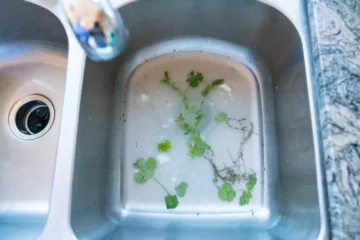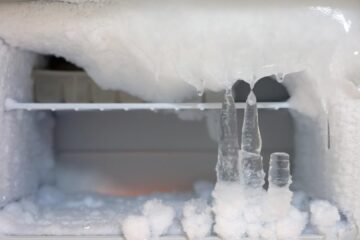:max_bytes(150000):strip_icc():format(webp)/How-to-Get-Rid-of-Garbage-Smells-02-1195269ab3d747de88e4bc89865b3245.jpg)
While changing the bag and washing the trash can with soap and water are good smart first steps in eliminating the odor, they only get you so far. Here are some solutions that will save your trash can from bad stenches.
How to Remove Odors From Trash Cans
Baking soda: Baking soda can solve just about any cleaning conundrum. You’re likely aware that baking soda in the back of your fridge can get rid of odors. The same is true for stinky trash cans. If you can is made out of plastic, just sprinkle a light layer of baking soda on the bottom before you put the bag in. For a metal can, you need to take one extra step to prevent corrosion: Pour a good amount of baking soda into a coffee filter and secure it with a twist tie before placing it in the bottom of the can. You can also sprinkle baking soda in a trash compactor each time you fill it to eliminate odors.
Dryer sheets: The fresh-smelling sheets that you use with clothes in the dryer can also work their magic on nasty trash can odors. When you take out the trash, just put one or two dryer sheets underneath the new bag. The sheets will absorb bad odors and leave a pleasant scent behind. Change the sheet each time you take out the trash.
Charcoal: Charcoal is proven to filter out odors. In fact, it’s used in cigarette filters and air purifying units. You don’t need activated charcoal; a basic bag of charcoal will do. Smash it up a bit (try a pick handle or broomstick) and put the bits into the trash. Let it sit overnight to absorb the odors.
Citrus peels: Zest from lemons, limes, and oranges, are adept at masking odors from trash. Use dry peels only.
:max_bytes(150000):strip_icc():format(webp)/How-to-Get-Rid-of-Garbage-Smells-hero-a41f470a842b45a88ea65552108a15c3.jpg)
Separate Your Garbage
One of the best techniques you can employ to keep garbage stench to a minimum is to separate your garbage. If you keep all of the waste from your home steeping in one trash can, the odors will mingle and multiply. Here’s how to segregate items:
- Cardboard, and paper products: These can accumulate until you take them to the recycling center or put them outside on recycling day.
- Recyclable and non-biodegradable waste: This includes plastic bottles, aluminum cans, and other non-biodegradable household waste items.
- Kitchen waste, food, and other biodegradable waste: Your best option is to compost these and then use as mulch or fertilizer. If that’s not doable, don’t mix vegetable peelings, leftovers or rotting food with other waste.
- Garbage: Everything else that can’t be recycled or composted belongs in this can.


